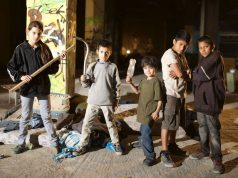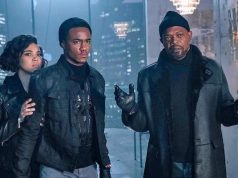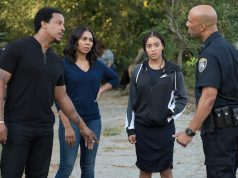As suggested by the title of the movie about him, Frank Lucas was the most American of gangsters. A poor black kid from North Carolina, he worked his way to the top of the New York City drug world in the early 1970s all by himself, taking full, perverse advantage of the American ideals of self-reliance and capitalism. Like the figures in “The Godfather” — a movie that was popular when Lucas was making it big and which “American Gangster” resembles in many ways — Lucas was living the American dream.
Directed with dazzling energy by Ridley Scott, “American Gangster” stars Denzel Washington as Lucas and Russell Crowe as Richie Roberts, the Brooklyn narcotics officer striving to bring him down. They do not meet until well into the lengthy (but not overlong) film, and for much of the time Roberts doesn’t know that it’s Lucas, specifically, that he’s after. So Scott, with a screenplay by Steven Zaillian (“Gangs of New York”), has plenty of time to establish the alpha males’ characters separately, and they’re both so vivid that if it weren’t for the title, you wouldn’t be able to say that either man was the “main” character.
Lucas and Roberts have stories that run sometimes parallel, sometimes perpendicular. Lucas is a cold-blooded killer, a ruthless businessman, and an unrepentant peddler of heroin to a generation of junkies. He’s also, however, a family man, faithful to his beautiful wife Eva (Lymari Nadal) and kind to his mother (Ruby Dee). The first thing he does when he gets rich is to move everyone up from North Carolina and give them a mansion to live in. It’s no accident that the Thanksgiving scene at Lucas’ house looks exactly like the Norman Rockwell painting.
Roberts, meanwhile, is perhaps the last honest cop left in an increasingly crooked police force. He is ethical to the letter, an unwavering and dogmatic defender of the law. He is also, however, a divorced father with a penchant for womanizing and some lowlife friends left over from his childhood.
When we first meet Lucas, he is the driver for renowned Harlem gangster and Robin Hood figure Bumpy Johnson. Upon Bumpy’s death, Lucas appoints himself his successor and quickly finds a way to make inroads into the heroin marketplace. The way it’s been working is that the crooked cops make drug busts, keep the heroin, dilute it with baby powder, then sell it back to the dealers to put on the streets. Lucas circumvents that by having bribe-receptive servicemen smuggle pure, unfiltered heroin back from Vietnam, which he can sell at a lower price than his competitors — and it’s better stuff, too. He even gives it a brand name, Blue Magic, and gets angry when one of his sellers waters it down but keeps the name. He wants the Blue Magic label to MEAN something, dammit!
Lucas’ system puts him at odds with more or less everyone. The bad cops are angry because they’ve been cut out of the loop. The Italian crime families are upset that someone has become a success without being part of their organization. The other dealers don’t appreciate Lucas creating a de facto monopoly in the heroin industry. No one has ever made it this big before without the backing of a syndicate. It’s like a Mom & Pop store suddenly overwhelming Wal-Mart.
The situation is so unusual that it’s a while before Roberts and his team figure out that Lucas isn’t working for anyone; HE’S the big fish they’re after. But establishing a case against him isn’t easy even after Lucas is identified as the target. His operation is impeccable. Business students should study him.
Lucas and Roberts are both richly portrayed in performances that are big and dynamic without going over the top. Washington gives Lucas calm but fierce menace, always sharply dressed and elegantly mannered, his smile belying the fact that he is capable of the rankest evil. Crowe, meanwhile, remains doggedly affixed to his task, increasingly disheveled in appearance as Roberts gradually comes to terms with hi disastrous personal life. Both men come across as likable, flawed heroes — which is a bit alarming, considering one of them is a murdering drug dealer.
Late in the film there’s a raid on a drug-processing lab that is cringe-inducingly graphic, full of gunshot wounds, nudity, and clouds of heroin floating in the air. It’s a perfect storm of adult content that serves to remind us of us just how sordid the whole thing is — you know, just in case we were getting too caught up in the entertainment value of such a crackling good story about two such fascinating men.
As I mentioned at the top, there are shades of “The Godfather” in Scott’s approach to the material, including a climax that parallels the baptism scene. The film is based on true story, though it’s unlikely that things really happened quite as dramatically as they do here. It makes you stop and reflect a minute. We Americans do revere our gangsters, don’t we? What’s up with that?
B+ (2 hrs., 37 min.; )





